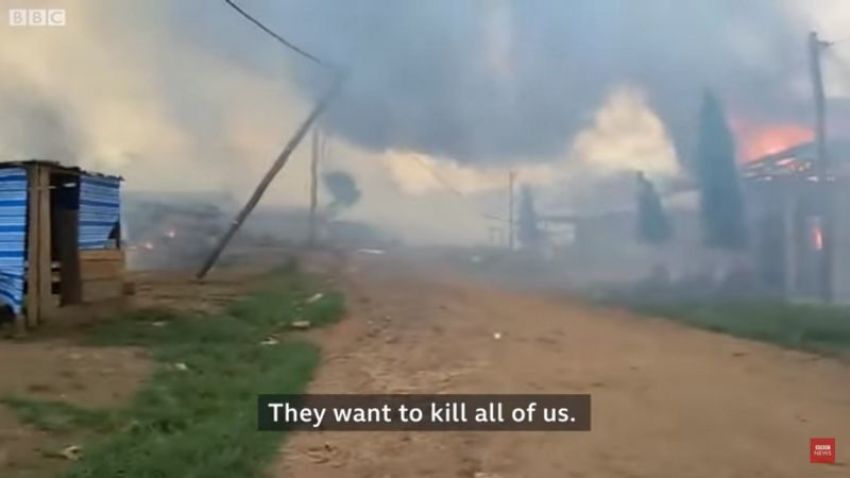Trump strips Cameroon of US trade benefits over torture, human rights abuses

President Donald Trump has stripped trade benefits from Cameroon over accusations that its military has committed human rights abuses against civilians and separatists in the West African country’s two civil war-ridden Anglophone regions.
In a letter to U.S. Congress last week, Trump blasted the Cameroonian government’s “persistent gross violations of internationally recognized human rights.”
The president said the French-speaking central government has failed to address concerns related to reports of extrajudicial killings, unlawful detentions, torture and other abuses said to have been committed by security forces against civilians and rebels.
“I am taking this step because I have determined that the Government of Cameroon currently engages in gross violations of internationally recognized human rights, contravening the eligibility requirements of section 104 of the (African Growth and Opportunity Act),” the president wrote in his letter.
Trump’s decision effectively removes Cameroon as a beneficiary of the African Growth and Opportunity Act, legislation passed in 2000 with the aim of assisting countries in Subsaharan Africa by giving them privileged access to the U.S. market.
Under AGOA, countries are able to export goods to the U.S. duty-free. But countries must maintain eligibility. One requirement is that countries not engage in gross violations of human rights. Partner countries must also demonstrate progress in areas such as establishing the rule of law, political pluralism, and workers’ rights.
As a result, Cameroon’s AGOA beneficiary status will expire on Jan. 1, 2020.
Since Cameroon’s Anglophone crisis began in 2016, thousands have been killed and hundreds of thousands have been displaced from their homes.
The civil conflict grew out of longstanding grievances of people in the two English-speaking regions of the country who felt they were being underrepresented by the French-speaking central government.
When protestors took to the streets in 2016, the government responded with deadly force. While actors on both sides of the conflict are accused of rights abuses, security forces are said to have killed civilians, burned down homes, and even tortured armed rebels.
This is not the first time the Trump administration has cracked down on Cameroon.
In February, the State Department cut $17 million in security aid to Cameroon that was used to fight terrorist groups in the region such as Boko Haram. At the time, the U.S. had called on the Cameroonian government to take all allegations of human rights violations seriously and hold perpetrators to account.
“Despite intensive engagement between the United States and the Government of Cameroon, Cameroon has failed to address concerns regarding persistent human rights violations being committed by Cameroonian security forces,” Trump stressed in his letter to lawmakers.
The president assured that he would continue to assess whether the Cameroonian security forces continue to engage in violations of international human rights law.
In some cases, the Cameroonian government has been accused of encouraging and arming radicals from the predominantly Muslim Fulani herding community to carry out attacks against communities in separatist-supporting communities.
Such attacks are said to be responsible for the deaths of two Bible translators near the Wum area of Southern Cameroon in recent months.
Last week, 65 civil society organizations wrote a letter calling on the African Commission on Human and Peoples’ Rights to address the systemic rights violations in Cameroon. The coalition stated that in the last three years, over 3,000 people have been killed while over 500,000 have fled from their homes.
According to the coalition, the government’s response to peaceful protestors who took to the streets in 2016 was “brutal,” as many were killed, leaders were arrested, civil society groups were banned and the internet was blocked.
“Since then, numerous separatist groups have emerged calling for the independence of the Anglophone regions and embracing the armed struggle,” the letter reads.
“Government forces and armed separatists have both been responsible for serious human rights abuses. Security forces have killed civilians, burned dozens of villages, arbitrarily arrested and tortured hundreds of alleged armed separatists. Armed separatists have also targeted civilians, kidnapped hundreds of people, tortured and killed perceived opponents while using intimidation and violence to keep children and their teachers out of school.”
Human Rights Watch’s Senior Central Africa Researcher, Ilaria Allegrozzi, is hopeful that Trump’s decision will serve as a “wake-up call” for the Cameroonian government.
“[It] should stir action from other international partners to Cameroon to publicly address serious human rights concerns in the country,” she wrote in an op-ed.
Last week, security forces were accused of beating and injuring at least 10 demonstrators who protested after the government banned three meetings planned by an opposition party, according to Human Rights Watch.
In 2018, American missionary Charles Wesco was killed while driving with his wife and son in Cameroon's northwest English-speaking region. It was reported that the family was caught in a crossfire between the military and separatist rebels. Wesco was the brother of Republican Indiana state Rep. Tim Wesco.
Although a journalist blamed the government for the killing, the government put the blame on separatist forces.
Follow Samuel Smith on Twitter: @IamSamSmith
or Facebook: SamuelSmithCP



























